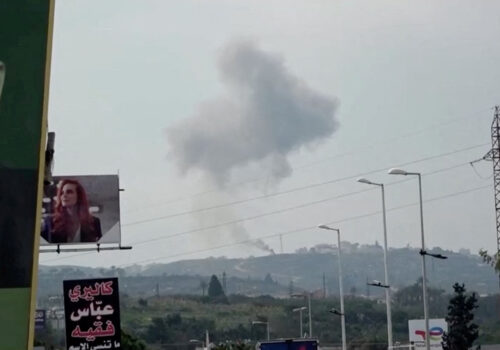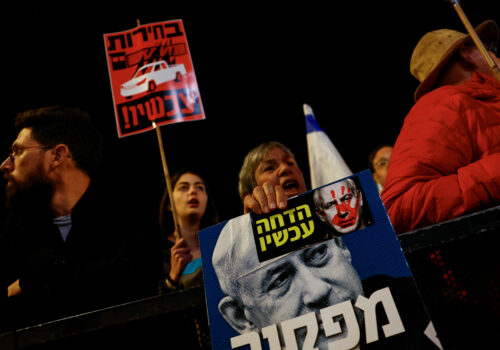The lost humanity of the crisis in Gaza
This article was updated on March 4, 2024.
Last week, as Israel sought to distribute humanitarian aid in northern Gaza, more than one hundred Gazans were left dead and hundreds more were injured. Palestinians on the ground said Israeli forces engaged in “extensive shooting.” Israel said that there were two different incidents and that its fire caused fewer than ten casualties. The competing narratives are a microcosm of the war itself, one in which neither Israelis nor Palestinians, nor the millions of supporters of each, can credibly recognize the pain or humanity of the other side.
Those of us out of harm’s way in Europe, the Americas, or Asia, on college campuses and in the privacy of our own homes, have enthusiastically participated in sorting ourselves into algorithmically fueled binary bins on social media. Doing so allows us to avoid being confronted with hard truths that dissent from our preconceived notions, but also prevents us from seeing the humanity in the other side, and in each other.
For Israel, the declaration that its actions resulted in the deaths of “fewer than ten” casualties was an attempt to take responsibility for some of the deaths while highlighting its innocence as to most of them. But at a time in which 30,000 Palestinians have died, such a statement does not come off as a demonstration of restraint but one of callousness. Such a dismissal ignores the fact that even if Israel’s narrative is completely accurate, it is still responsible for the deaths of several Palestinians, even if they were too close to the trucks. The narrative ignores the basic humanity of Gazans, who were starving and desperate and are now dead because they sought a scrap of the limited food available.
On the other hand, there has been almost no recognition or acknowledgement, especially on social media, that the incident was based off of good intentions by Israel. The goal of the distribution was part of an Israeli plan to get additional food to Gazans by working with Gazan businessmen.
That lack of recognition is quintessentially human. In the face of such a tragedy—and the broader ongoing one in Gaza—it’s easy to dismiss intentions as irrelevant. But intentions do matter. It’s within intentions that we recognize humanity. Not pausing to understand the intentions here, while understandable, encourages Palestinians to dismiss Israel’s humanity, as well. So it becomes easy to believe the Hamas-run health ministry’s version of events as simply a “massacre,” alternative explanations being unnecessary given how they interfere with preconceived notions.
The true dilemma of last week’s incident is not in determining whose version of events is more accurate but in being willing to recognize that the conflict is one of moral duality. There are two competing frameworks as to the right way forward for the conflict that are both true and morally legitimate, but both are also so inherently contradictory and divergent that acknowledging the other has become next to impossible.
Frameworks that blind
Framework one is that Israel must continue its military operations despite the tens of thousands of innocent Palestinian men, women, and children who have perished. With hostages still being held in Gaza—and especially in the face of reports that upwards of fifty of them have died in captivity—military pressure is one of the few ways to try to speed their release, as reflected by Israel’s agreement to the framework of the current proposal for a six-week pause in military operations and a hostage/prisoner swap.
More broadly, continued military operations are the only way Israel can eliminate the threat posed by Hamas and prevent future deaths, kidnappings, and mass rapes of its citizens. With Rafah the last major locale for operations, the 1.3 million Palestinians there need to be protected and moved, as Prime Minister Benjamin Netanyahu himself has called for. But if the operation does not happen, it will ensure Israel loses the war as well as ensure the survival of Hamas’s capabilities, with its leaders alive and ready to attack Israel again at the next available opportunity.
Framework two is that Israel’s five-month military campaign should cease immediately. The 1967 war lasted six days; the 1973 Yom Kippur war, nineteen days; the 2006 war with Hezbollah, thirty-three days; the 2014 Gaza war, about fifty days. Today, the war has stretched far longer than any conflict Israel has fought in decades, with military victory far from assured but 30,000 dead. Even if Israel’s claims that it has killed upwards of 10,000 Hamas fighters are accurate, that still leaves 20,000 innocent men, women, and children dead, and countless more injured.
Israel originally estimated there to be about 30,000 Hamas fighters. On the low end, that would leave 20,000. For months, Israel has made promises of progress on the ground and timelines that have not come to fruition. The fight has been harder than expected, with military losses (more than 240 Israeli soldiers) the most in a war in decades. Israel cannot defeat the ideology of Hamas, so all that’s left is for Israel to destroy Rafah as it destroyed the rest of Gaza, killing tens of thousands of more innocents in its wake.
These two frameworks are in stark competition, and yet both are accurate. The fundamental problem of ignoring one in favor of instinctive agreement with the other is that doing so disregards the fact that both are rooted in the same moral goal—the desire to prevent more death and destruction. For Gazans, the potential of that death and destruction exists tomorrow. For Israelis, that potential exists next week or next month or next year.
The extremists are winning
Because both frameworks are running parallel to each other with no intersection to be had, the gap between them is being filled by those truly winning the war: terrorists and extremists. That’s Iran and Hamas on one side, with Israeli ultranationalists such as Itamar Ben-Gvir and Bezalel Smotrich on the other. They are happy to see the conflict continue, to exacerbate the lack of humanity being demonstrated.
For Iran, five months into the conflict, its position in the region has strengthened. With global opinion having turned against Israel for its prosecution of the conflict, Iran is leveraging that opposition to try to justify its own propaganda against Israel, never mind that the conflict was triggered because of Iran’s provision of weapons, money, and training to Hamas that enabled the October 7 attacks to happen.
Even Saudi Arabia, a US ally, is doing what it can to avoid conflict with Iran—for example, declining to join the US-led coalition against the Houthis as they attack shipping vessels in the Red Sea. Riyadh is desperate to reach a resolution with the Houthis to ensure nothing interferes with its Vision 2030 economic plan, especially since it still lacks US security guarantees to protect the country.
In Israel, Smotrich and Ben Gvir—who don’t represent close to the majority of Israelis—see in Gaza an opportunity to “reclaim” what they view as having been lost following then Prime Minister Ariel Sharon’s 2005 disengagement from Gaza. Their hope of Israelis living in Gaza once more—something many Likud party members have also professed interest in—is trumped only by their desire for it to be accompanied by the displacement of millions of Gazans to Egypt or other Arab countries.
At the same time, their defense and promotion of not just settlements but settlers engaged in violence in the West Bank threatens to be the spark that will ignite a conflagration. Sixty-three percent of Palestinians view a new intifada as the best pathway to a future Palestinian state—numbers likely to increase the longer the conflict continues in Gaza.
If Israel is not careful, then the very conditions Smotrich and Ben Gvir hope to provoke—renewed violence in the West Bank prompting Israeli forces to try to stamp it out, by necessity—will emerge. Right-wing ultranationalists may well succeed in leveraging a new intifada to further expand settlements in the territories and to force Palestinians to leave their homes.
But everyone else, aside from the extremists and terrorists—Israeli, Palestinian, and Iranian—will lose. More violence, more death, less humanity—rinse and repeat.
The path forward
So, what is the humane way forward in the short term?
First, a temporary ceasefire has never been more necessary. Even six weeks will provide time and space for massive amounts of humanitarian aid to enter Gaza and for Israel to have the time to reassess its efforts. During that time, the United States and its global allies need to come up with a plan that ensures a sustained and sufficient amount of aid is safely flowing into Gaza on a daily basis, not just for the coming months but for the coming years.
Second, given that Israel will not end its fight against Hamas after a brief ceasefire, as too much of a threat remains, it should reorganize the fight. For months, Israeli officials have told me and other colleagues that the plan is to wind down major operations and start counterterrorism operations (or counter-insurgency, it’s not clear which) that will stage in Israel and enter Gaza one to three days at a time with clear and precise goals: to kill Hamas leaders, target command-and-control centers, and destroy Hamas infrastructure, including Gaza’s hundreds of miles of tunnels. Israel needs to implement this plan and make it the reality of its military operations to diminish, as much as possible, the collateral damage being suffered by innocents in Gaza.
Third, the international community needs to acknowledge Israel’s legitimate security concerns and decide how it will approach those concerns. The Arab world and the broader global community have been clear that they will not put forces in Gaza. As a result, Israel is slipping back into occupation; Netanyahu made that clear in his post-war plan. The plan is unlikely to become fully realized, but the presence of Israeli troops in Gaza to ensure Israeli security is a near certainty.
The US desire to train (or retrain) Palestinian Authority security forces cannot come to fruition quickly enough. But in the meantime, countries need to be honest in international fora and with their publics. They may personally oppose Israeli occupation, but unless they change their mind about putting in troops, they should acknowledge that it will be the reality. They should work with global allies to define a timeline and associated benchmarks a “revitalized” Palestinian Authority needs to hit, so when the two converge, Israel will withdraw its troops.
Fourth, US President Joe Biden’s domestic critics should recognize that while imperfect, his strategy to hold Israel tight has paid dividends. The criticism that Biden has faced conflates not being as effective as desired with not being effective at all. In doing so, it ignores how much less humanitarian aid would be entering Gaza if not for his efforts. And it ignores the hostage negotiations and potential ceasefire that may come from Washington’s diplomacy.
But there can be no doubt that the strategy has not been as successful as hoped. The United States has a terrible track record of getting involved in other countries’ politics, and trying to advocate a different approach directly with the Israeli people risks backfiring at a time when most Israelis may loathe Netanyahu but believe the war is just and should continue.
But these are desperate times. Opposition leader Benny Gantz—who only joined the government out of a sense of patriotism and has more credibility than any other leader—is set to meet with Vice President Kamala Harris and other top officials this week in Washington, and he is doing so over the objection of Netanyahu. The United States must publicly steer clear of supporting Gantz or pushing for elections in Israel. But meeting with Gantz in Washington, or in Israel, sends a worthwhile signal at a time when the largest challenge to the US-Israel relationship remains Netanyahu. Those who expect Gantz to be a dovish hero of the left will be sorely disappointed. But he would be a prime minister without the weight of ultranationalists in his coalition and without the threat of jail time potentially influencing his decisions.
Fifth, the United States needs to work with allies to be very clear about the plan in the event a regional conflict breaks out because Hezbollah attacks Israel or Israel attacks Hezbollah. For the duration of the current conflict, preventing a regional war has been one the Biden administration’s primary goals. And yet, today, as US officials seek to prevent such a conflict, the potential for it is increasing. It is hard to imagine the current conflict getting worse, but a regional one would ensure that the last five months will be seen in retrospect as merely a prologue to previously unimaginable chapters of violence, destruction, and death throughout the Middle East.
Eventually this iteration of conflict will end, and legitimate questions will arise as to whether supporters of Israel and of the Palestinians adequately acknowledged the pain, fear, and legitimate moral convictions of those with whom they so vehemently disagreed. Or whether, in addition to everything else lost, their humanity was as well.
Jonathan Panikoff is the director of the Scowcroft Middle East Security Initiative in the Middle East Program.
Further reading
Fri, Mar 1, 2024
As fighting along the Lebanon-Israel border escalates, diplomats scramble to head off a war
MENASource By Nicholas Blanford
The chances of calming the Lebanon-Israel border will be that much greater if a temporary ceasefire in Gaza evolves into a permanent ceasefire.
Wed, Feb 14, 2024
The ‘day after’ is today: An evasive Netanyahu is abdicating his responsibility for Israel’s fate
MENASource By Shalom Lipner
Trapped between two cabinets with conflicting outlooks, Prime Minister Benjamin Netanyahu has resorted to stonewalling.
Thu, Feb 22, 2024
The future of Saudi-Israeli relations is a balancing act between Palestinian and regional interests
MENASource By R. Clarke Cooper
Any credible movement to formalize bilateral relations between Riyadh and Jerusalem cannot ignore what the Saudis have consistently stated about the two-state solution.
Image: People are checking the destruction caused by overnight Israeli bombardment in Deir Balah in the central Gaza Strip on February 23, 2024, as battles between Israel and the Palestinian militant group Hamas continue. (Photo by Majdi Fathi/NurPhoto)


